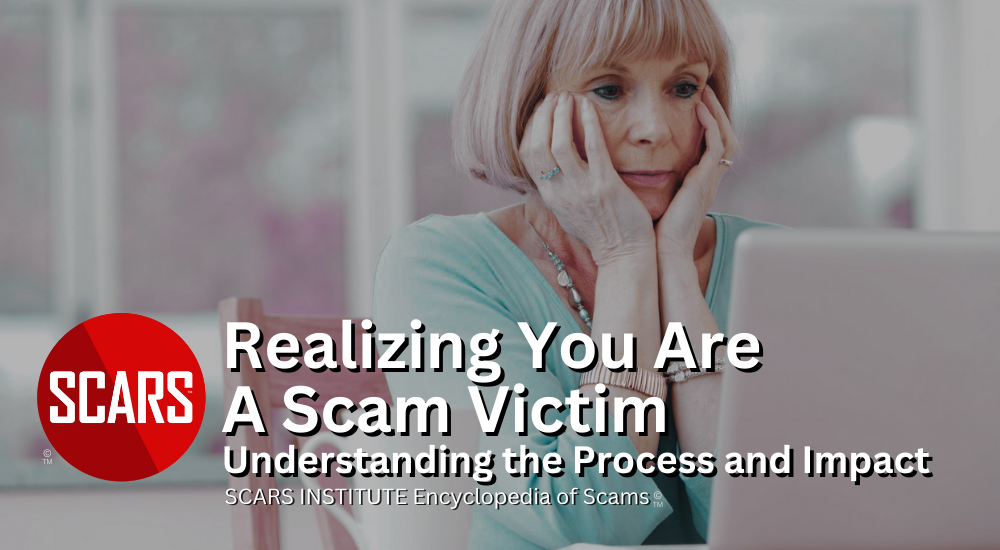
SCARS Institute’s Encyclopedia of Scams™ Published Continuously for 25 Years

Scamouflage – SCARS Institute Term for Scammer’s Hiding In Plain Sight
Scam Terms – A SCARS Institute Insight
Author:
• Tim McGuinness, Ph.D., DFin, MCPO, MAnth – Anthropologist, Scientist, Director of the Society of Citizens Against Relationship Scams Inc.
Originally Published: 2011 – Article Updated: 2024
Article Abstract
Scamouflage is a SCARS Institute term used to describe how scammers, fraudsters, and cybercriminals use deceptive tactics to hide their true identities and intentions. By creating fake profiles, using stolen photos, and crafting elaborate backstories, scammers can blend into online spaces and appear trustworthy.
This form of camouflage allows them to exploit human trust and manipulate victims without raising immediate suspicion.
Through various forms of scamouflage, such as impersonating businesses, creating fake job postings, or using fake dating profiles, scammers can effectively trick victims into providing money or personal information. The variety of approaches scammers use makes it difficult for victims to recognize fraudulent activity until it’s too late.

What is Scamouflage?
Scamoulage is a SCARS Institute term that describes the deceptive methodologies and tactics used by scammers to conceal their true identity and intentions behind fake profiles, identities, or fabricated narratives.
Just as camouflage is used in nature to blend into the surroundings, scammers utilize false information, doctored or stolen photos, fake identities, and elaborate backstories to hide in plain sight on digital platforms.
By creating seemingly trustworthy personas or companies, scammers trick individuals into believing they are interacting with genuine people or services, making it easier to manipulate and exploit their targets without raising suspicion. This tactic plays a central role in various types of online fraud, including romance scams, phishing schemes, and financial fraud.
Scamoulage is a concept that blends camouflage and scams, describing how scammers strategically disguise themselves and their intentions through elaborate deceptions.
This tactic involves creating fake profiles, identities, or entire personas, often using stolen photos, false narratives, deep fake photos and videos, and forged credentials, to blend into online environments like social media, dating platforms, or financial services. Just as animals use camouflage in nature to avoid detection from their prey, scammers use digital tools to make their fake identities seem genuine, allowing them to manipulate and exploit victims without being detected until it is too late.
Types of Scamouflage
Scamoulage can take many forms, such as using the image of an attractive person to build trust in romance scams, pretending to be a legitimate business or investment guru in financial scams, even posing as an amateur anti-scam group, or posing as technical support in phishing schemes. These crafted personas often mirror societal ideals of trustworthiness or success, making it easier for scammers to lure in their victims.
The Effectiveness of ‘Scamoulage’
The effectiveness of ‘Scamoulage’ lies in its ability to exploit human cognitive biases and the innate trust people often place in others when interacting online. By appearing to be trustworthy, familiar, or authoritative, scammers can manipulate emotions, build rapport, and gradually extract money, personal information, or other valuable resources from their victims.
Here’s a list of 25 different kinds of Scamouflage, describing various ways scammers disguise themselves and their schemes to manipulate and deceive victims:
- Romance Scam Profile – Using fake attractive photos and love letters to pose as a potential romantic partner.
- Fake Business Websites – Creating websites that imitate legitimate businesses to trick people into paying for fake services or products.
- Tech Support Scams – Pretending to be tech support agents from well-known companies like Microsoft or Apple to gain access to personal computers and financial information.
- Phishing Emails – Sending emails that look like they come from a trusted company, tricking victims into clicking malicious links or sharing sensitive data.
- Social Media Impersonation – Creating profiles that mimic real people, such as influencers or celebrities, to gain followers or scam others.
- Fake Charity Scam – Setting up a fake charity, often in response to natural disasters or crises, to solicit donations.
- Investment Scam (Ponzi schemes) – Posing as a financial advisor offering too-good-to-be-true investment opportunities to steal money.
- Lottery or Prize Scam – Contacting victims with the claim they’ve won a lottery or prize and need to pay a fee to collect their winnings.
- Fake Job Posting – Advertising fake job openings, requesting personal information or upfront fees from job seekers.
- Government Impersonation – Pretending to be government agencies like the IRS or Social Security to scare people into making payments or revealing personal details.
- Military Personnel Scam – Scammers pose as members of the military, especially deployed soldiers, asking for financial help or romantic involvement.
- CEO Fraud/Business Email Compromise – Posing as a company executive to trick employees into transferring company funds.
- Fake Online Marketplace Sellers – Setting up fake listings for popular items at low prices on eBay, Craigslist, or Facebook Marketplace to scam buyers.
- Fake Pet Sales – Posting fake listings for pets for sale and asking for payment upfront before disappearing.
- Rental Scam – Offering fake rental properties or rooms online, collecting deposits without having a real property available.
- Debt Collection Scam – Claiming to be a debt collector, threatening legal action to scare victims into paying fake debts.
- Inheritance Scam – Posing as a lawyer or estate executor, informing the victim of a large inheritance and requesting legal fees to process the funds.
- Fake Online Dating Profiles – Creating profiles on dating platforms that lure victims into emotionally and financially manipulative relationships.
- Fake Cryptocurrency Exchange – Offering investment in a fake cryptocurrency or an exchange platform to steal money or personal information.
- Delivery Service Scam – Pretending to be from a legitimate courier service and demanding personal information or payment for delivery of a package.
- Identity Theft via Fake Social Media Links – Using fake social media promotions or contests to capture personal details and commit identity fraud.
- Scareware – Sending fake virus alerts on computers, urging victims to buy fake antivirus software or call tech support for help.
- Online Auction Scams – Manipulating online auction bids and accepting payment without delivering goods.
- Fake Academic Institutions – Creating fake universities or degree programs to scam students out of tuition fees.
- Fake News Scam – Disguising fake news articles or websites to manipulate public opinion or collect advertising revenue through sensationalized content.
There are so many more!
These different forms of Scamouflage show the variety of approaches, methodologies, techniques, and tactics scammers use to blend into legitimate settings, making it harder for victims to identify their fraudulent activities until they pounce.
A Note About Labeling!
We often use the term ‘scam victim’ in our articles, but this is a convenience to help those searching for information in search engines like Google. It is just a convenience and has no deeper meaning. If you have come through such an experience, YOU are a Survivor! It was not your fault. You are not alone! Axios!
Statement About Victim Blaming
SCARS Institute articles examine different aspects of the scam victim experience, as well as those who may have been secondary victims. This work focuses on understanding victimization through the science of victimology, including common psychological and behavioral responses. The purpose is to help victims and survivors understand why these crimes occurred, reduce shame and self-blame, strengthen recovery programs and victim opportunities, and lower the risk of future victimization.
At times, these discussions may sound uncomfortable, overwhelming, or may be mistaken for blame. They are not. Scam victims are never blamed. Our goal is to explain the mechanisms of deception and the human responses that scammers exploit, and the processes that occur after the scam ends, so victims can better understand what happened to them and why it felt convincing at the time, and what the path looks like going forward.
Articles that address the psychology, neurology, physiology, and other characteristics of scams and the victim experience recognize that all people share cognitive and emotional traits that can be manipulated under the right conditions. These characteristics are not flaws. They are normal human functions that criminals deliberately exploit. Victims typically have little awareness of these mechanisms while a scam is unfolding and a very limited ability to control them. Awareness often comes only after the harm has occurred.
By explaining these processes, these articles help victims make sense of their experiences, understand common post-scam reactions, and identify ways to protect themselves moving forward. This knowledge supports recovery by replacing confusion and self-blame with clarity, context, and self-compassion.
Additional educational material on these topics is available at ScamPsychology.org – ScamsNOW.com and other SCARS Institute websites.
Psychology Disclaimer:
All articles about psychology and the human brain on this website are for information & education only
The information provided in this article is intended for educational and self-help purposes only and should not be construed as a substitute for professional therapy or counseling.
While any self-help techniques outlined herein may be beneficial for scam victims seeking to recover from their experience and move towards recovery, it is important to consult with a qualified mental health professional before initiating any course of action. Each individual’s experience and needs are unique, and what works for one person may not be suitable for another.
Additionally, any approach may not be appropriate for individuals with certain pre-existing mental health conditions or trauma histories. It is advisable to seek guidance from a licensed therapist or counselor who can provide personalized support, guidance, and treatment tailored to your specific needs.
If you are experiencing significant distress or emotional difficulties related to a scam or other traumatic event, please consult your doctor or mental health provider for appropriate care and support.
Also read our SCARS Institute Statement about Professional Care for Scam Victims – click here to go to our ScamsNOW.com website.
If you are in crisis, feeling desperate, or in despair please call 988 or your local crisis hotline.
-/ 30 /-
What do you think about this?
Please share your thoughts in a comment below!
LEAVE A COMMENT?
Recent Comments
On Other Articles
- Arwyn Lautenschlager on Love Bombing And How Romance Scam Victims Are Forced To Feel: “I was love bombed to the point that I would do just about anything for the scammer(s). I was told…” Feb 11, 14:24
- on Dani Daniels (Kira Lee Orsag): Another Scammer’s Favorite: “You provide a valuable service! I wish more people knew about it!” Feb 10, 15:05
- on Danielle Delaunay/Danielle Genevieve – Stolen Identity/Stolen Photos – Impersonation Victim UPDATED 2024: “We highly recommend that you simply turn away form the scam and scammers, and focus on the development of a…” Feb 4, 19:47
- on The Art Of Deception: The Fundamental Principals Of Successful Deceptions – 2024: “I experienced many of the deceptive tactics that romance scammers use. I was told various stories of hardship and why…” Feb 4, 15:27
- on Danielle Delaunay/Danielle Genevieve – Stolen Identity/Stolen Photos – Impersonation Victim UPDATED 2024: “Yes, I’m in that exact situation also. “Danielle” has seriously scammed me for 3 years now. “She” (he) doesn’t know…” Feb 4, 14:58
- on An Essay on Justice and Money Recovery – 2026: “you are so right I accidentally clicked on online justice I signed an agreement for 12k upfront but cd only…” Feb 3, 08:16
- on The SCARS Institute Top 50 Celebrity Impersonation Scams – 2025: “Quora has had visits from scammers pretending to be Keanu Reeves and Paul McCartney in 2025 and 2026.” Jan 27, 17:45
- on Scam Victims Should Limit Their Exposure To Scam News & Scammer Photos: “I used to look at scammers photos all the time; however, I don’t feel the need to do it anymore.…” Jan 26, 23:19
- on After A Scam, No One Can Tell You How You Will React: “This article was very informative, my scams happened 5 years ago; however, l do remember several of those emotions and/or…” Jan 23, 17:17
- on Situational Awareness and How Trauma Makes Scam Victims Less Safe – 2024: “I need to be more observant and I am practicing situational awareness. I’m saving this article to remind me of…” Jan 21, 22:55
ARTICLE META
Important Information for New Scam Victims
- Please visit www.ScamVictimsSupport.org – a SCARS Website for New Scam Victims & Sextortion Victims
- Enroll in FREE SCARS Scam Survivor’s School now at www.SCARSeducation.org
- Please visit www.ScamPsychology.org – to more fully understand the psychological concepts involved in scams and scam victim recovery
If you are looking for local trauma counselors please visit counseling.AgainstScams.org or join SCARS for our counseling/therapy benefit: membership.AgainstScams.org
If you need to speak with someone now, you can dial 988 or find phone numbers for crisis hotlines all around the world here: www.opencounseling.com/suicide-hotlines
A Note About Labeling!
We often use the term ‘scam victim’ in our articles, but this is a convenience to help those searching for information in search engines like Google. It is just a convenience and has no deeper meaning. If you have come through such an experience, YOU are a Survivor! It was not your fault. You are not alone! Axios!
A Question of Trust
At the SCARS Institute, we invite you to do your own research on the topics we speak about and publish, Our team investigates the subject being discussed, especially when it comes to understanding the scam victims-survivors experience. You can do Google searches but in many cases, you will have to wade through scientific papers and studies. However, remember that biases and perspectives matter and influence the outcome. Regardless, we encourage you to explore these topics as thoroughly as you can for your own awareness.
Statement About Victim Blaming
SCARS Institute articles examine different aspects of the scam victim experience, as well as those who may have been secondary victims. This work focuses on understanding victimization through the science of victimology, including common psychological and behavioral responses. The purpose is to help victims and survivors understand why these crimes occurred, reduce shame and self-blame, strengthen recovery programs and victim opportunities, and lower the risk of future victimization.
At times, these discussions may sound uncomfortable, overwhelming, or may be mistaken for blame. They are not. Scam victims are never blamed. Our goal is to explain the mechanisms of deception and the human responses that scammers exploit, and the processes that occur after the scam ends, so victims can better understand what happened to them and why it felt convincing at the time, and what the path looks like going forward.
Articles that address the psychology, neurology, physiology, and other characteristics of scams and the victim experience recognize that all people share cognitive and emotional traits that can be manipulated under the right conditions. These characteristics are not flaws. They are normal human functions that criminals deliberately exploit. Victims typically have little awareness of these mechanisms while a scam is unfolding and a very limited ability to control them. Awareness often comes only after the harm has occurred.
By explaining these processes, these articles help victims make sense of their experiences, understand common post-scam reactions, and identify ways to protect themselves moving forward. This knowledge supports recovery by replacing confusion and self-blame with clarity, context, and self-compassion.
Additional educational material on these topics is available at ScamPsychology.org – ScamsNOW.com and other SCARS Institute websites.
Psychology Disclaimer:
All articles about psychology and the human brain on this website are for information & education only
The information provided in this article is intended for educational and self-help purposes only and should not be construed as a substitute for professional therapy or counseling.
While any self-help techniques outlined herein may be beneficial for scam victims seeking to recover from their experience and move towards recovery, it is important to consult with a qualified mental health professional before initiating any course of action. Each individual’s experience and needs are unique, and what works for one person may not be suitable for another.
Additionally, any approach may not be appropriate for individuals with certain pre-existing mental health conditions or trauma histories. It is advisable to seek guidance from a licensed therapist or counselor who can provide personalized support, guidance, and treatment tailored to your specific needs.
If you are experiencing significant distress or emotional difficulties related to a scam or other traumatic event, please consult your doctor or mental health provider for appropriate care and support.
Also read our SCARS Institute Statement about Professional Care for Scam Victims – click here to go to our ScamsNOW.com website.
















Thank you for your comment. You may receive an email to follow up. We never share your data with marketers.